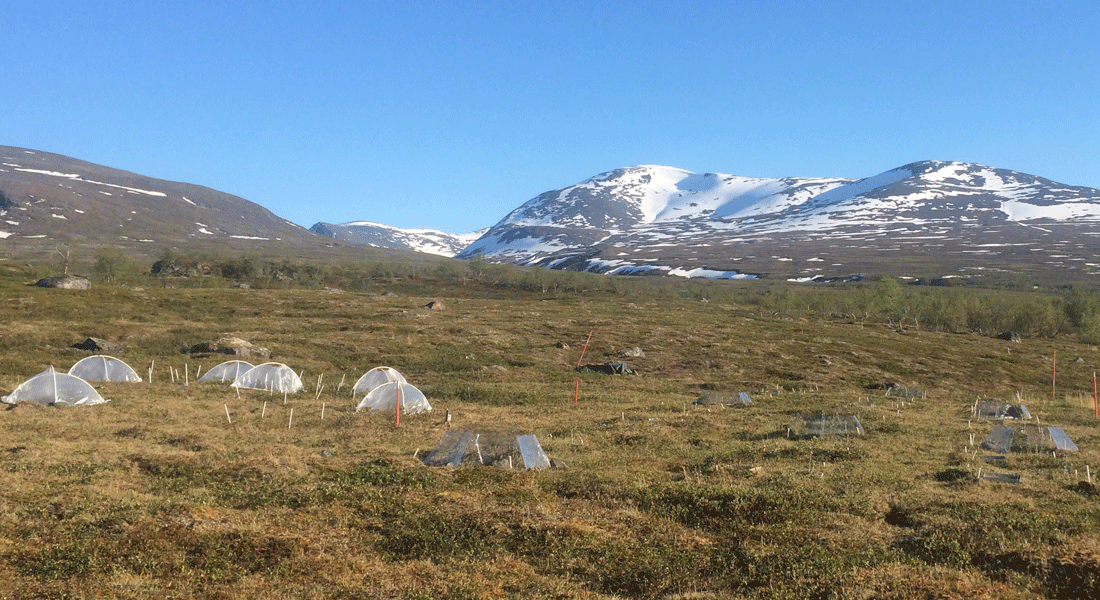Plant Physiological Ecology & Biogeochemistry (Michelsen) Lab

The fields of research are within general and physiological ecology in terrestrial systems, including interactions between the ecosystem components, and the biodiversity of soil organisms and plants. Major approaches include investigation of plant physiological and biogeochemical responses to natural environmental variation and to global and regional environmental changes and disturbances (e.g. climate change, UV-B radiation and land use).
We also study the interactions between aboveground processes such as photosynthesis, the relation to tissue chemistry, and to belowground processes, such as nutrient mineralisation and uptake by plants.
Our research is primarily experimental and includes both process-level and organism/population-level components. It spans a range of temporal and spatial scales, including:
-
use of stable isotopes in ecology
-
gas exchange at leaf and whole plant level
-
nutrient mineralisation, plant nutrient uptake, and soil–microbe–plant interactions
-
nitrogen flow and carbon cycling at community, ecosystem, and landscape levels
The research takes place in arctic and temperate ecosystem types. The group is using the facilities in the Ecological-Chemical Laboratory, the Isotope Ratio Mass Spectrometry and the Ecophysiology Laboratory. Field work takes place in Denmark, Sweden (Abisko), Greenland (Zackenberg, Disko), and elsewhere.
The group has funding from EU Marie Curie (2021-2023), Carlsberg Foundation (2021; 2022) and DFF-FNU (2020-2023; 2022-2025).
The group is also part of CENPERM - Center for Permafrost (2012-2022)
Center for Permafrost, CENPERM, funded with100 mio. DKK by Danish National Research Foundation (Danmarks Grundforskningsfond), investigates the interactions between microorganisms, soil and plants in relation to permafrost dynamics and trace gas emission. The Center is a close collaboration between Dept. of Geosciences and Dept. of Biology at University of Copenhagen.
The group teaches in the courses:
- Arctic biology
- General ecology
- Experimental design and statistical analysis in biology
- Biological experiments: design and analysis
- Experimental design and methodology in ecology
- Methodology and sampling in environmental management
- Plant ecophysiology
- Terrestrial ecosystem processes and global change
The Ecological-Chemical Laboratory carries out high precision physical and chemical analyses of soils, plants, gases and liquids. The laboratory is fully updated in analytical equipment and takes on analytical tasks for the scientific staff at the Dept. of Biology as well as for external reseachers. For instance we analyze:
Plant species composition
Plant biomass
Elements as C,N, P and heavy metals in soil, plants and liquids
Secondary metabolites as tannins and flavonoids
15N og 13C natural abundance and enrichment
Photosynthesis with Licor 6400XT
CH4, CO2 and BVOC
Microbial biomass CNP
Ergosterol, PLFA, Biolog plates
Screening for mycorrhiza fungi
The analytical equipment includes
Hitachi U-2000 and U-2010 Spectrophotometers
Shimadzu Total Organic Carbon Analyzer TOC/TN
Perkin Elmer Atomic Absorption Spectrophotometer
Shimadzu GC-17A Gas Chromatograph
Fiastar 5000 Flow Analyzer
LECO TruSpec Carbon Nitrogen Determinator
NIR Spectrometer
Eltra CS 500 Total Carbon Determinator
Aquatec 5400 Analyzer
EuroVector Elemental Analyzer EA3028-HT
Micromass IsoPrime Isotope Ratio Mass Spectrometre
Agilent GC/MS with thermal desorption
Picarro isotopic greenhouse gas analyser
Current and future M.Sc/PhD/post doc projects may address questions as
- Does permafrost thaw lead to enhanced nutrient availability and plant N uptake?
- How far does ammonia emission from farms affect plants and sensitive ecosystems?
- Does climate change affect microbial and plant uptake of nitrogen?
- What is the role of ericoid and ectomycorrhizal fungi for carbon balance in northern ecosystems?
- Will arctic and danish heath ecosystems be future sources or sinks for CO2?
- Is more methane emitted from plants, soil and litter when temperatures increase?
- To which extent does N2 fixation by microorganisms associated with plants lead to nitrogen enrichment in other ecosystem compartments?
Please contact Anders Michelsen for discussion of possible projects.
Group members
| Name | Title | Phone | |
|---|---|---|---|
| Anders Michelsen | Professor | ||
| Christoffer Bugge Harder | Postdoc | +4535328507 |
